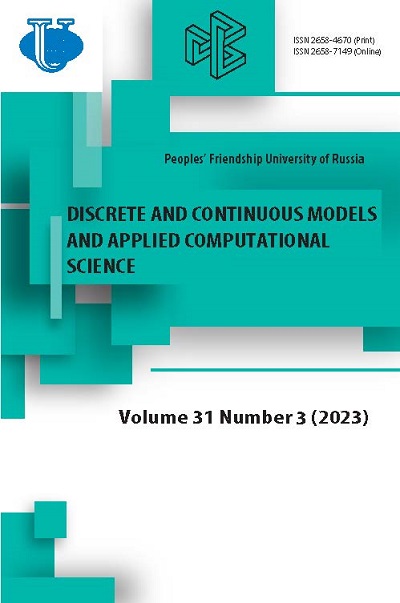Asymptotic diffusion analysis of the retrial queuing system with feedback and batch Poisson arrival
- 作者: Nazarov A.A.1, Rozhkova S.V.1,2, Titarenko E.Y.2
-
隶属关系:
- National Research Tomsk State University
- National Research Tomsk Polytechnic University
- 期: 卷 31, 编号 3 (2023)
- 页面: 205-217
- 栏目: Articles
- URL: https://journal-vniispk.ru/2658-4670/article/view/315339
- DOI: https://doi.org/10.22363/2658-4670-2023-31-3-205-217
- EDN: https://elibrary.ru/LACMZU
- ID: 315339
如何引用文章
全文:
详细
The mathematical model of the retrial queuing system \(M^{[n]}/M/1\) with feedback and batch Poisson arrival is constructed. Customers arrive in groups. If the server is free, one of the arriving customers starts his service, the rest join the orbit. The retrial and service times are exponentially distributed. The customer whose service is completed leaves the system, or reservice, or goes to the orbit. The method of asymptotic diffusion analysis is proposed for finding the probability distribution of the number of customers in orbit. The asymptotic condition is growing average waiting time in orbit. The accuracy of the diffusion approximation is obtained.
作者简介
Anatoly Nazarov
National Research Tomsk State University
Email: nazarov.tsu@gmail.com
ORCID iD: 0000-0002-5097-5629
Doctor of Technical Sciences, Professor of Department of Probability Theory and Mathematical Statistics, Institute of Applied Mathematics and Computer Science
36 Lenin Avenue, Tomsk, 634050, Russian FederationSvetlana Rozhkova
National Research Tomsk State University; National Research Tomsk Polytechnic University
Email: rozhkova@tpu.ru
ORCID iD: 0000-0002-8888-9291
Doctor of Physical and Mathematical Sciences, Professor of Department of Mathematics and Computer Science, School of Core Engineering Education, National Research Tomsk Polytechnic University, professor of Department of Probability Theory and Mathematical Statistics, Institute of Applied Mathematics and Computer Science, National Research Tomsk State University
36 Lenin Avenue, Tomsk, 634050, Russian Federation; 30 Lenin Avenue, Tomsk, 634050, Russian FederationEkaterina Titarenko
National Research Tomsk Polytechnic University
编辑信件的主要联系方式.
Email: teu@tpu.ru
ORCID iD: 0000-0002-0478-8232
Lecturer of Mathematics and Computer Science, School of Core Engineering Education
30 Lenin Avenue, Tomsk, 634050, Russian Federation参考
- T. Phung-Duc, Retrial queueing models: A survey on theory and applications, 2019. arXiv: 1906.09560.
- J. Kim and B. Kim, “A survey of retrial queueing systems,” Annals of Operations Research, vol. 247, no. 1, pp. 3-36, 2016. doi: 10.1007/s10479-015-2038-7.
- Y. Barlas and O. Özgün, “Queuing systems in a feedback environment: Continuous versus discrete-event simulation,” Journal of Simulation, vol. 12, no. 2, pp. 144-161, 2018. doi: 10.1080/17477778.2018.1465153.
- A. Melikov, V. Divya, and S. Aliyeva, “Analyses of feedback queue with positive server setup time and impatient calls,” in Information technologies and mathematical modelling (ITTM-2020), Proceedings of the 19th International Conference named after A.F. Terpugov (2020 December, 2-5), Tomsk: Scientific Technology Publishing House, 2021, pp. 77-81.
- N. Singla and H. Kaur, “A two-state retrial queueing model with feedback and balking,” Reliability: Theory & Applications, vol. 16, no. SI 2 (64), pp. 142-155, 2021. doi: 10.24412/1932-2321-2021-264-142-155.
- A. A. Nazarov, S. V. Rozhkova, and E. Y. Titarenko, “Asymptotic analysis of RQ-system with feedback and batch Poisson arrival under the condition of increasing average waiting time in orbit,” Communications in Computer and Information Science, vol. 1337, pp. 327-339, 2020. doi: 10.1007/978-3-030-66242-4_26.
- A. A. Moiseev, A. A. Nazarov, and S. V. Paul, “Asymptotic diffusion analysis of multi-server retrial queue with hyper-exponential service,” Mathematics, vol. 8, no. 4, 2020. doi: 10.3390/math8040531.
补充文件









